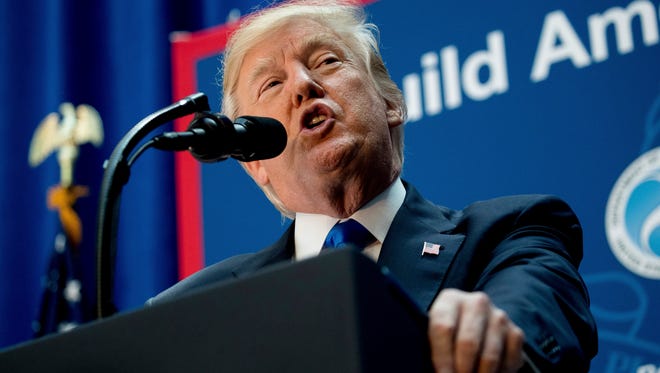In Wisconsin visit Tuesday, Donald Trump will tout apprenticeships to close skills gap
 Craig Gilbert
Craig GilbertWASHINGTON - President Donald Trump will visit Waukesha County Technical College on Tuesday as part of his push to expand the nation’s use of apprenticeships to fill unmet labor needs, White House officials said.

Trump will tour the school with his daughter and adviser Ivanka Trump, Labor Secretary Alexander Acosta and Gov. Scott Walker. The president will headline a political fundraiser afterward for Walker, who is up for re-election next year.
The White House is using its visit to the school to publicize its goal to vastly “scale up” the use of apprenticeship programs to close a skills gap that is making it hard to fill many jobs in manufacturing and other sectors.
A four-year college degree “is not the right path for everyone,” said Ivanka Trump, who has visited and hailed Germany’s famed apprenticeship system as a model for the U.S. She said apprenticeships were a key to making sure “the next generation of the American worker is trained in the skills of the future.”
White House aide Reed Cordish said the visit to WCTC would highlight the “marriage” between businesses and community colleges and technical schools when it comes to training workers to fill jobs that are locally available and in demand.
Wisconsin is an example of a blue-collar state with a relatively strong tradition, by U.S. standards, of apprenticeships.
RELATED:Help wanted: Manufacturers hiring even as overall job numbers decline
RELATED:Wisconsin's Robin Vos and Paul Farrow meet with Trump on infrastructure
RELATED:Scott Walker asks Trump administration for go-ahead on drug testing for health benefits
But it’s also a place where business and political leaders have complained that a skills gap is a big factor holding back job growth. While statewide unemployment has declined to a 17-year-low of 3.2%, job growth has been chronically sluggish.
Data released last week show that private-sector employment in Wisconsin grew at a rate of just 0.5% in 2016, less than half the national rate of 1.3% and the slowest pace since the country began coming out of the severe recession of 2008 and 2009. Wisconsin was one of 28 states last year that suffered a net job loss in manufacturing — the traditional backbone of this state’s economy.
Experts have debated whether the key to future growth in the state is a larger pool of college-educated workers or boosting vocational and technical schools to tailor the education system more closely to the job market.
RELATED:Paul Ryan defends president in James Comey case and says Trump is 'new at government'
The goal of expanding apprenticeships, particularly in the tech fields, has enjoyed increased attention and bipartisan support in recent years.
At WCTC in Pewaukee, the president, Walker and Ivanka Trump will tour classrooms and training facilities, including a new manufacturing training center the school launched last year. They will also hold a discussion with local business owners and apprentices in training.
“The students (there) are learning skills and trades that will lead to their employment right in that area, jobs that are available — good, high-wage jobs that are available in that locality,” said Cordish, assistant to the president for intergovernmental and technology initiatives. He spoke to reporters on a conference call with Ivanka Trump and Acosta.
The president will follow his Wisconsin visit with a speech Wednesday in Washington, D.C., on workforce development. Ivanka Trump will host a discussion with about 15 CEOs at the White House on the same day on the issue.
The White House will bring in eight governors Thursday — their names were not released — for another discussion with the president, his daughter and Vice President Mike Pence.
“This is an initiative that has our absolute highest level of attention and focus,” said Cordish, citing the three days of events.
White House officials did not detail the proposals they would be announcing, though they made it clear they would not center on increased funding for job training. In fact, the president has proposed significant budget cuts in overall job training.
Last month, faculty union leaders at Milwaukee Area Technical College blasted Trump’s budget proposals and said they would undermine “the nation’s efforts to build a high-wage, knowledge-based economy by slashing support for career and technical education.”
White House officials argued that the problem with federal job training programs is not money but effectiveness. They said they want to encourage more apprenticeships funded by private industry working with local community colleges and technical schools.
Part of this could be done “through administrative actions alone,” including steps to be announced next week to make it easier for industry to design and certify apprenticeship programs, they said.
Administration officials said they viewed a big part of the task as public “messaging” — touting skills and trades as promising, “respectable” alternatives to four-year college degrees.
“We’ll be launching a series of initiatives, call on Congress to pass various reforms expanding apprenticeships and raise awareness about the fact that there are important and very viable and respectable career paths outside of a traditional four-year college experience that should be considered and should be invested (in),” said Ivanka Trump, who is helping lead the administration’s efforts on this issue.
She said an expanded apprenticeship system could help close the gender and racial gaps in wages by expanding opportunities for women and minorities in fields where they are underrepresented, such as technology and engineering.
This is Trump’s second visit to Wisconsin as president and third since winning the 2016 election. Trump was the first Republican to carry the state since Ronald Reagan in 1984, boosted by unusually large margins among blue-collar (non-college) white voters.